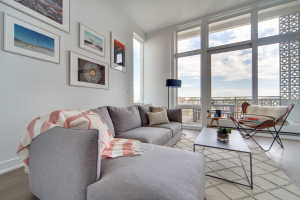
Chicagoland’s rental market remains scorching hot. New luxury apartment buildings featuring high-class studio units are going up in neighborhoods close to the Loop, but renters who are looking for an affordable alternative to those places are being pushed farther from the city’s center.
A company called Common seeks to step into the space between those two extremes. The New York City-based startup focuses on the phenomena of co-living. Common’s tenants — called “members” in the company’s literature — pay a single bill each month that covers utilities, rent, furniture and even cleaning supplies.
The buildings resemble dormitories in the sense that they offered shared common space and facilities. Common’s communal spaces are cleaned on a weekly basis, and fresh linens provided. The startup works to build a sense of community within its homes by offering shared activities on a weekly and monthly basis, including meals, movie nights and yoga classes.
“People are living with roommates for longer and later into their lives,” says Common founder and CEO Brad Hargreaves. “Some do it out of economic necessity, while others seek the togetherness and community that living with others can provide. The result is that many more Americans — and approximately a third of all households 22-35 — live with roommates.”
Common sees this demographic as an underserved segment of the housing market. Few developers and property management companies consider the specific needs of people who opt for shared housing, despite many rental units being shared by roommates. The company seeks to make it safer, more convenient and more enjoyable to try this type of housing.
Prospective members submit an application and go through background and financial checks, then go through a short interview. Once the screening is completed, they can sign a lease for an opening at any given Common location across some of the most desirable neighborhoods in the country.
Expansion into the Chicagoland market
After seeing success with this model in New York, Washington, D.C. and the San Francisco Bay area, Common has opened its first co-living property in West Town, near the intersection of Chicago and Damen avenues. Two more Common properties will soon open in Chicago. Common Damen offers 12 bedrooms on three floors, with each floor comprising an apartment suite that includes a high-end kitchen and a living room. The suites also have front and rear balconies. The building itself has a rooftop deck, shared laundry facilities and several community spaces.
The startup works with many different types of properties and uses demographic trends to identify places where demand is growing without taking on more space than it can fill. Common’s operating model isn’t so much different from that of a typical rental property management company. Rather than purchasing buildings, Common focuses on building a network of communities. Property owners can introduce a building they already own or identify a property that Common helps them to purchase for the network. Common then enters into a partnership agreement with the property owner. Its real estate partners can enter a management agreement with Common that gives them a higher cash-on-cash yield or sign a master lease that offers a stable, fixed return on the building.
“Chicago, like other densely populated cities around the country, is experiencing a huge demand for housing, especially affordable options for renters making between $40,000–$80,000 per year,” Hargreaves says. “We chose Ukrainian Village specifically for its proximity to public transportation, local retail and because we could offer an affordable price point.”
The company has more than 400 members across its properties, with between 500 and 700 new member applications coming per week for 13 homes in four cities.
Leases are flexible and set up in three-, six-, nine- and 12-month increments, depending on the successful applicant’s needs.
“More than 70 percent of all members are on 12-month leases and most stay on for more than a year because they enjoy the community experience,” Hargreaves says.